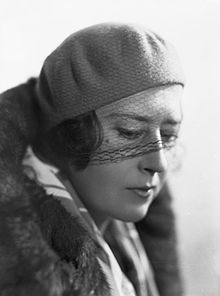Maria Pawlikowska-Jasnorzewska
Maria Pawlikowska-Jasnorzewska , b. Kossak (born November 24, 1891 in Krakow , † July 9, 1945 in Manchester ), was a Polish writer. She is considered the most important Polish poet of the interwar period .
Life
Pawlikowska-Jasnorzewska was born in 1891 into a wealthy, noble family of artists. Her brother Jerzy Kossak , her father Wojciech Kossak and her grandfather Juliusz Kossak were well-known painters, her sister Magdalena Samozwaniec was a writer like herself. Pawlikowska-Jasnorzewska received private tuition, self-taught in languages, natural sciences and philosophy and attended the Academy of Fine Arts in Krakow . She began to write poetry in her childhood, but did not publish her first volume of poetry Niebieskie migdały ( Eng .: blue haze ) until 1922. Between the two world wars, she published twelve volumes of poetry and one volume of poetic prose; During this time she belonged to the Skamander group of poets . From 1924 she also wrote dramas in which she took up taboo subjects and many of which, despite their success on stage, were not published as books during her lifetime. Her satirical play Baba Dziwo ( Eng : Wondrous Woman ) with a female main character satirizing Adolf Hitler was premiered on December 13, 1938 in Krakow, which led to protests from the German government.
With her third husband, Stefan Jasnorzewski, she fled in 1939, after the start of the Second World War , via Romania and France to Blackpool in England, where her husband was stationed as a pilot. In 1944 she developed bone cancer and died the following year. Posthumously, her last volume of poetry Ostatnie utwory (German: The last works ) and 1993 Ostatnie notatniki (German: Last Notes ) appeared in 1956 , in which she documented her illness and her death. In Poland, her work was only rediscovered after her work was published in 1958.
plant
Pawlikowska-Jasnorzewska's style cannot be assigned to any current of Polish literature. Love, death and transience in nature were central themes of her poems from the beginning. The volume Szkicownik poetycki (German: Poetic Sketchbook ), published shortly before the outbreak of war, contains apocalyptic images and premonitions of the war; the following volumes are also shaped by the awareness of the end of mankind.
Honor
In 1982 the main belt asteroid (4114) Jasnorzewska was named after Pawlikowska-Jasnorzewska.
source
- Anna Milanowski: Pawlikowska-Jasnorzewska, Maria . In: Authors Lexicon. Ed. V. Ute Hechtfischer, Renate Hof, Inge Stephan and Flora Veit-Wild. Frankfurt / M. Suhrkamp 2002, p. 419f. ISBN 3518399187
Web links
| personal data | |
|---|---|
| SURNAME | Pawlikowska-Jasnorzewska, Maria |
| ALTERNATIVE NAMES | Kossak, Maria (maiden name) |
| BRIEF DESCRIPTION | Polish poet and writer |
| DATE OF BIRTH | November 24, 1891 |
| PLACE OF BIRTH | Krakow , Poland |
| DATE OF DEATH | July 9, 1945 |
| Place of death | Manchester , UK |
